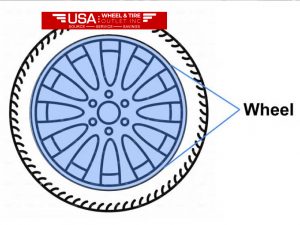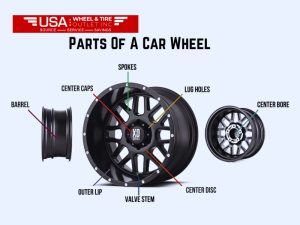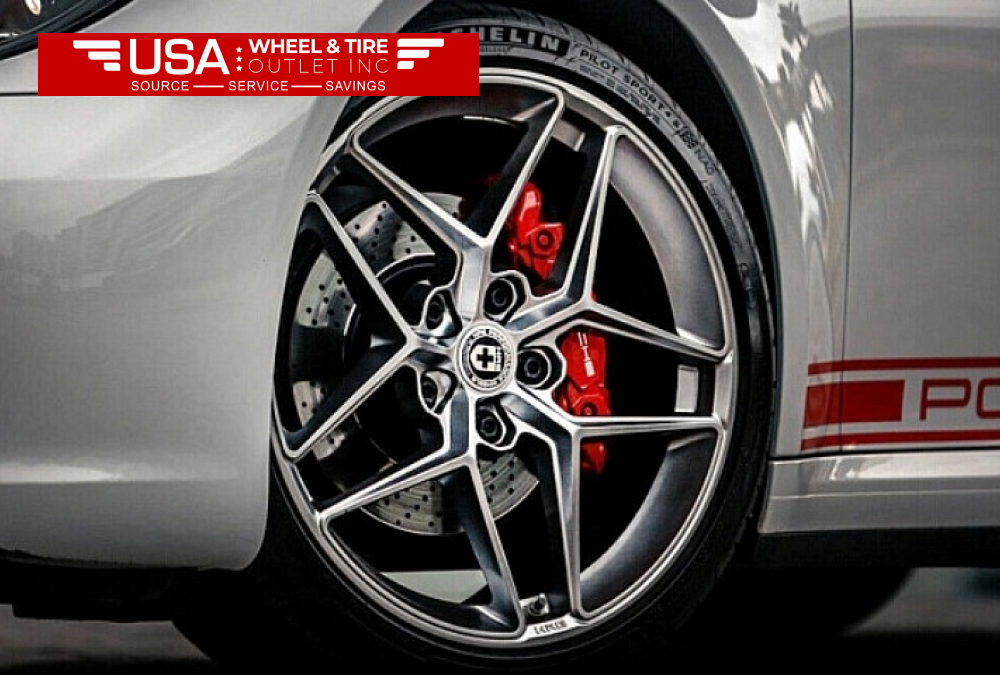Wheels are one of the essential elements of any vehicle, but many might not know their significance or the reason they’re important. From bicycles, cars, and trucks wheel play crucial roles in ensuring smooth and safe movement, security as well as overall performance. In this article we’ll discuss what we call the terms used to describe wheels and the most important wheel parts and the reason wheels for automobiles are vital to the performance of your vehicle. We’ll also discuss the maintenance of your wheels to ensure your wheels are in top condition.
Understanding the Wheels Definition
In essence, the wheel is a circular piece of equipment designed to turn around an axle. It helps in moving by reducing friction and also supports the weight of vehicles. Wheels are available in different sizes and designs based on the kind of vehicle, from tiny bicycle wheels to big truck wheels. For all your wheel needs, USA Wheels and Tires INC offers a wide range of solutions tailored to different vehicle types.

The wheel definition is more than just their form. It encompasses the entire system comprising the tire, hub, rim and the other components supporting them. The wheel assembly is connected to the suspension of the vehicle and to its axle that allows the car to brake, roll, and maneuver around turns with ease.
The Role of Wheels in a Vehicle
Wheels play a variety of roles within a vehicle.
Support load The wheels carry the burden of the vehicle including passengers, cargo as well as structures of the car.
Allows motion Wheels give you the capability to roll either forward or backwards when the motor is running.
Allow steering The Enable Steering feature assists with turning and allow the driver to shift direction.
Aids with Braking Wheels that are properly functioning are crucial for braking smoothly and stopping the vehicle in a safe manner.
Without wheels, a car wouldn’t be able to perform at a high level. They are crucial to ensure safety, efficiency, and comfort.
Key Wheel Components
A wheel is more than an unassuming circular disc. It is made up of many components that work together to ensure that your vehicle runs smoothly. Knowing the major components of the wheel will help you maintain your vehicle.
1. Rim
The wheel’s rim is the outermost part of the wheel in which the tire is installed. It is what holds the tire in place and provides its structure. Rims are available in a variety of types of materials, including aluminum, steel and alloys. They are available in a variety of designs for both aesthetic and functional reasons.
2. Tire
Its tire is the part of rubber that is wrapped over the wheel. It gives grip, absorbs shocks thrown off by the road and contributes to the handling of the vehicle. There are various types of tires that are designed to meet the needs of different conditions of weather, driving requirements and road surfaces.
3. Hub
Its hub is the main portion of the wheel that it joins the axle. The hub allows the wheel to spin and connects it to the drivetrain of the vehicle. It’s often fitted with bearings in order to lessen friction and ensure smooth movement.
4. Spokes (in some wheels)
Some wheels, specifically those used for bicycles, or some old-fashioned car models, feature spokes which connect the rim with the hub. The spokes add an additional level of support for the wheel’s structure and to distribute the load equally.
5. Valve Stem
Its valve stem is a tiny protrusion of the wheel that allows air to be pumped into the tire. It is connected to the inner chamber of the tire and assists in maintaining tire pressure. A proper tire pressure is essential to ensure safe driving, which is why this valve stem becomes an essential element that makes up the tire assembly.
6. Bearings
Bearings within the wheel assembly reduce friction between the wheel with the axle. They play a vital function in ensuring that the wheel moves smoothly as they ensure your vehicle runs without resistance.

The Importance of Automotive Wheels
The wheels of a car are vital to each vehicle’s performance. They’re not just involved in allowing a vehicle to move and turn, but they also impact braking, handling and security. Here’s the reason automobile wheels are essential for your car:
1. Performance
The quality and type of the wheels you choose to use will affect the performance of your car. For instance, lightweight wheels tend to improve the acceleration of your vehicle and improve efficiency of fuel. alloy wheels specifically, are engineered to weigh less than conventional steel wheels, allowing for improved handling and performance. However the larger wheels enhance stability and give more grip on the road.
2. Handling and Safety
The wheels play a major role in how your vehicle performs on various types of terrain. The best tires and wheels offer greater traction, which means safe driving conditions. When you’re driving through the mud or at speed, automotive wheels are crucial for maintaining control and prevent accidents.
3. Comfort
Wheels play an important part in the comfort of riding. Combining the type of tire and the wheels ability to absorb shocks affects the ride quality. larger tires with higher sideswall height assist in absorbing shocks from rough roads, making for an easier and more comfortable driving experience.
4. Fuel Efficiency
The lighter wheels, such as ones made of aluminum alloys, decrease the car’s weight. This weight reduction could help improve efficiency in fuel consumption since the engine has to work less to move the vehicle.
Wheel Maintenance: Why It Matters
The correct maintenance of your wheels is vital to ensure your vehicle runs well and remains safe on the roads. Without proper maintenance, your wheels may suffer damages, which could lead to dangers to your safety and expensive repairs.
1. Tire Pressure Maintenance
Maintaining the correct tires’ pressure is among the most crucial aspects of maintaining your wheels. Tires that are not properly inflated can lead to more friction, which can lead to increased wear on tires and lower fuel efficiency. Over-inflated tires, on contrary, could result in rough ride and increased chance of blowouts. Monitoring your tire pressure frequently ensures that your wheels are in good shape.
2. Regular Inspections
Regular inspections of your tires and tires will help you identify the early signs of wear and tear. Check for signs of cracks, chips and excessive wear to your tires. If your tires are showing evidence of wear and tear, it’s recommended to repair them or replaced prior to the damage getting worse.
3. Wheel Alignment
An incorrect steering wheel alignment could cause uneven wear on your tires which makes your car harder to steer, and decreasing the safety of your vehicle overall. If your car is moving to one side or the steering wheel is off-center, you need an alignment. A proper alignment will ensure that your wheels are working in harmony making them more efficient and extending the life of your tires.
4. Tire Rotation
Regular rotation of the tires assists in spreading wear evenly throughout your tires. In time, rear and front tires wear differently based on the way your vehicle drives. By rotating them, you can extend their life and ensure that your wheels are in good shape.
5. Balancing Your Wheels
Wheel balancing assures it is possible to ensure that the burden of every wheel is distributed evenly. This minimizes vibrations, stops uneven wear on the tires and provides a smoother journey. A regular balance of your wheels is vital, especially in the event that you experience shakes or wobbling when driving.
How to Choose the Right Wheels for Your Vehicle
Selecting the best wheels for your car is an important decision which affects performance, safety and appearance. A set of wheels that is perfect will improve the handling of your vehicle as well as fuel efficiency and overall appearance. But how do you decide the right wheels for you?
1. Consider Your Driving Needs
It is the first thing to evaluate how you drive. If you are a frequent driver on the highway, you could prefer lightweight, smooth wheels to increase fuel efficiency. If you drive frequently on uneven terrain, tough wheels that are made of tough materials, like steel or alloy wheels may be the best choice to increase traction and strength.
2. Wheel Size Matters
The dimensions of the wheels play an important part in the car’s performance. The larger wheels can enhance the appearance and stability of the vehicle however, they can also reduce the ride quality. Smaller wheels offer an easier ride, but they may not offer the same stability at higher speeds. It’s crucial to strike the right balance of style and functionality in the context of your driving.
3. Material Choices
Wheel materials affect the weight, strength and endurance. Aluminium alloy wheels can be lighter as well as fuel efficient, but may be more vulnerable to being damaged by road debris. steel wheels are heavier but more robust and resistant to damage and make them a good option for off-road vehicles or difficult driving conditions.
The Impact of Wheel Alignment on Vehicle Performance
Wheel alignment plays a vital part in ensuring optimal performance of the wheels on your vehicle. Incorrectly aligned wheels can result in uneven tire wear, decrease fuel efficiency, and impact the handling. This is how alignment can affect your car:
1. Improved Steering and Handling
A proper alignment will ensure that your wheels are pointed at the right angle. This increases the responsiveness of steering and control, which makes it easier to manage the car. Uneven alignment can cause the vehicle to slide towards one side, making the steering more difficult and unpredictable.
2. Reduced Tire Wear
If your wheels are correctly aligned, your tires will wear equally. Incorrect alignment could cause uneven wear, which reduces the lifespan of your tires, and may require frequent replacements. If you notice that one tire wearing more quickly over the other side, then it may be the time to align them.
3. Better Fuel Efficiency
Wheels that are properly aligned reduce the amount of resistance that they exert, meaning the vehicle doesn’t need to exert as much effort to move. This results in better efficiency in fuel consumption, which could help you save money in the long run.
Signs Your Wheels Need Maintenance or Repair
Regularly checking and maintaining your wheels is essential to ensure they’ll continue to function efficiently. If you observe any of these signs then it’s time to contact a an expert for repairs or maintenance
1. Vibrations While Driving
If you experience vibrations on the seat or steering wheel when traveling, that could be a sign of that your wheels are not functioning properly. This could be because of insufficient balancing, incorrect alignment or bent wheels. Ahead of time, addressing these issues can help avoid any further damage, and can improve your the comfort of your ride.
2. Uneven Tire Wear
Uneven wear on your tires is typically an indication of an issue with your suspension or wheel alignment. If one of your tires wears down more quickly over the other side, it’s important to inspect your wheels.
3. Steering Pulls to One Side
If your vehicle is pulling towards one side it could indicate an alignment issue. This is not just making driving uncomfortable, but it can increase the chance of accidents. A simple wheel alignment will resolve this issue and help ensure your vehicle’s stability.
The Benefits of Upgrading to Custom Wheels
Upgrades to custom wheels can dramatically improve the appearance and efficiency of your car. Here are some advantages of upgrading on to customized wheels:
1. Enhanced Aesthetics
Custom wheels are among the most effective methods to give your car a an individual and distinctive look. From striking colours to intricate designs, you can modify your wheels to fit your personal style and help your car stand out in the crowd.
2. Better Performance
Custom-designed wheels can be constructed using light materials, such as aluminum alloys. These will improve your vehicle’s acceleration handling, handling, and efficiency in the use of fuel. The lighter wheels lower the mass of your car and allow for faster response time and better overall performance.
3. Improved Durability
Custom wheels of high-end quality, particularly ones made of alloys that are forged, can be more durable and more resilient to wear and tear than ordinary wheels. If you’re driving on rough terrain or are facing severe temperatures, customized wheels give you a longer-lasting and durable ride.
Conclusion
Knowing how to read the wheel definition and the primary components of your wheel is vital to keep your car in top condition. Wheels do not just serve the purpose of transporting your vehicle, they also contribute to safety, performance and ease of use. From the wheel’s rim up to wheel as well as the hub every component has a crucial role to play in ensuring that you enjoy a smooth and comfortable journey.
Regular maintenance on your wheels is essential for extending the life of your tires and to ensure your car is running optimally. A properly inflated tire, proper wheel alignment, and frequent inspections can help avoid costly repairs, and can enhance the driving experience.
You may want to boost your vehicle’s performance by installing custom automobile wheels or make sure your current wheels are in great shape by utilizing professional maintenance for your wheels knowing the fundamentals of your wheels could make an enormous difference in the world.
Read Also: Wheels America: Expert Wheel Repair and Customization
FAQs About Wheels: Definition and Importance
1. What is the meaning of the term “wheel?
The wheel can be described as a circular piece that is designed to turn around an axle, allowing motion. It is crucial in machines and vehicles for reducing friction and making it easier to move.
2. What are the primary components of the wheel?
The major components of a wheel comprise the hub, rim, and spokes (or discs). They work together to provide stability and function.
3. What are the importance of wheels in automobiles?
Wheels are essential for mobility as they support the vehicle’s weight and allowing an traction. They also assist to maintain control and stability when traveling.
4. What kinds of materials are used to create wheels?
Wheels are usually made of metals like aluminum, steel or alloys to ensure strength, durability, light weight and toughness.
5. How do wheels affect the efficiency of fuel?
The weight and size of wheels can affect the efficiency of fuel. Wheels that are heavier or larger could reduce efficiency, but appropriately sized wheels can improve performance.
6. What’s the difference between wheels and rims?
It is also the outside part of the wheel which helps to hold the tire. The wheel consists of the rim, as well as the entire structure connected with the axle.
7. What effect do wheels have on the handling of a vehicle?
Wheels impact handling by offering stability, grip and reactivity. Correctly aligned wheels guarantee the smoothest and safest driving.
8. Are all wheels of the identical in dimensions?
The wheels are different sizes, based on car’s model and its function. The right size of wheel ensures the compatibility and efficiency.
9. What’s the purpose that spokes play in the life of a car?
Spoke wheels help distribute weight evenly, offer structural support and provide visual appeal to some bikes and motorbikes.
10. How often should the wheels be checked?
The wheels should be regularly inspected to ensure alignment, damage and the correct inflation. Regular inspections make sure that the wheels are safe and extend the life of wheels and tires.





